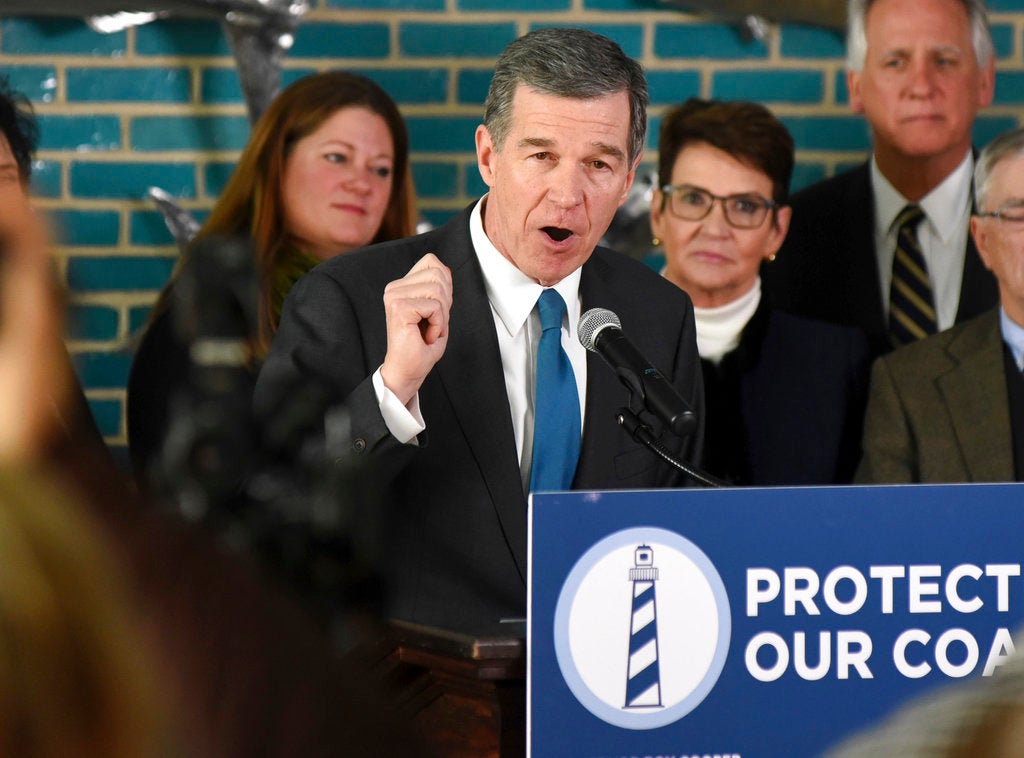Lawmakers attack Cooper in Jerry Springer style
Published 3:31 pm Monday, February 12, 2018

- North Carolina Gov. Roy Cooper speaks during a press conference about his opposition to offshore drilling at The Blockade Runner in Wrightsville Beach. Meanwhile, lawmakers in Raleigh were questioning negotiations over a pipeline. AP
RALEIGH — For a solid 30 minutes, it looked like state legislators might actually have a bill that everyone could support.
House and Senate leaders held a press conference Thursday to announce they’d found a solution to mandated smaller elementary school class sizes. That’s the law that prompted widespread complaints from school superintendents who worried they’d have to cut arts, music and PE in order to hire more classroom teachers.
Legislators unveiled a bill that would phase in the requirement over four years — with no change for the 2018-19 school year — and add more funding for arts and PE classes.
The proposal seemed to address the concerns Democrats had been expressing for months, using the phrase “class size chaos.” So would Senate leader Phil Berger be joining Gov. Roy Cooper for a champagne toast to public education by the end of the week?
Nope. This is Raleigh in an election year, and the signs of turmoil were apparent even before the legislative session began. Early in the week, no one in leadership would say what was on the agenda. Reporters’ emails and calls were ignored or met with vague statements.
And during the press conference to tout the class size solution, no one mentioned that there were other surprises added to the bill. In the spirit of 2013’s famous “motorcycle abortion” combination bill, Republicans added two unrelated provisions that Democrats and Gov. Roy Cooper were sure to hate — forcing them into an uncomfortable vote.
One addressed the makeup of the state’s elections board, a few weeks after the N.C. Supreme Court ruled that the legislature’s previous attempt to reshape the board was unconstitutional. The latest proposal would keep an even split between Republicans and Democrats but add a ninth board member who’s not in either party.
The impact of that provision is that the court battle will likely continue, and that could mean the board overseeing elections remains vacant even as candidate filing begins and primary elections loom.
But that issue was overshadowed by a fight over a $57.8 million fund Cooper privately negotiated with the Atlantic Coast Pipeline, which recently won state permits to build a natural gas pipeline near Interstate 95.
The energy companies developing the pipeline will pay to help offset set environmental impacts and boost economic development efforts along the pipeline route. But Republicans argue it’s unconstitutional for Cooper to control the money — the legislature usually handles budget matters — and they question whether the money came in exchange for the permits. Cooper says the fund was negotiated separately.
“The appearance of evil is insurmountable,” Rep. Dean Arp, R-Union, said during a surprise inquisition of Cooper’s new legislative director, who was previously a lobbyist for one of the pipeline’s developers.
Lee Lilley had been on the job for just five days — arriving after the pipeline agreement was signed — but Republican lawmakers decided to grill him like a deadbeat dad on “The Jerry Springer Show.” Most of their questions raised legitimate concerns that the Cooper administration should answer, but Lilley didn’t have the answers because he’d been told he was just there to introduce himself.
The end result was an hourlong spectacle that made Democrats irate and washed away any goodwill from the class size solution. So why make such a big deal over $57.8 million and a pipeline that the leaders of both parties support?
My sense is Republicans think they can make Cooper look corrupt in a state where prominent Democrats of past decades have gone to jail. They also recognize that the gas pipeline is a tough issue for Cooper because many environmentalist Democrats oppose it (some were arrested in a recent protest at the governor’s office).
Cooper has sought to divert attention by stressing his strong opposition to offshore drilling, but the GOP’s action keeps the focus on the pipeline. The class size/elections board mega-bill also seizes the $57.8 million from the governor and directs it to public school districts along the pipeline route.
Both the legislature and the governor have good ideas for the money, but that’s not really what the fight’s about.
It’s just another constitutional battle over who’s more powerful: The legislature or the governor? The courts will end up settling it after both sides spend heavily on lawyers.
And the average voters — who have better things to do than keep score in incessant lawsuits — will tune out.
Colin Campbell is editor of the Insider State Government News Service. Follow him at NCInsider.com or @RaleighReporter. Write to him at ccampbell@ncinsider.com.

